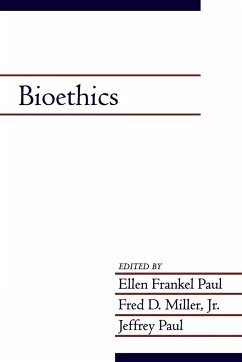Technological innovations and social developments have led to dramatic changes in the practice of medicine and in the way that scientists conduct medical research. Change has brought beneficial consequences, yet these gains have come at a cost, for many modern medical practices raise troubling ethical questions: Should life be sustained mechanically when the brain's functions have ceased? Should potential parents be permitted to manipulate the genetic characteristics of their embryos? Should society ration medical care to control costs? Should fetal stem cells be experimented upon in an effort to eventually palliate or cure debilitating diseases? Bioethicists analyze and assess moral dilemmas raised by medical research and innovative treatments; they also counsel healthcare practitioners, patients, and their families. In this anthology, fifteen philosophers, social scientists, and academic lawyers assess various aspects of this field.
Table of contents:
1. Bioethics and the problem of pluralism; 2. Pragmatism in bioethics: been there, done that; 3. The ordination of bioethicists as secular moral experts; 4. Information(al) matters: bioethics and the boundaries of the public and the private; 5. Bioethics as social philosophy; 6. Social moral epistemology; 7. Why health is not special: errors in evolved bioethics intuitions; 8. Power, integrity, and trust in the managed practice of medicine: lessons from the history of medical ethics; 9. The distribution of life-saving medical resources: equality, life expectancy, and choice behind the veil; 10. Pharmacogenetic interventions, orphan drugs, and distributive justice: the role of cost-benefit analysis; 11. The ubiquity and utility of the therapeutic misconception; 12. Indifference of subjects: an alternative to equipoise in randomized clinical trials; 13. The biophilosophical basis of whole-brain death; 14. Freedom and responsibility in genetic testing; 15. Genes, justice, and obligations to future people.
A focus on issues including: the responsibilities of researchers to subjects in clinical trials; proper criteria for determining when a living organism dies; allocation of scarce, life-saving medical resources; subsidization of pharmaceutical products for those who may miss out on the benefits modern medicine has brought.
Assesses the methodology of bioethics and examines a variety of moral and political issues.
Hinweis: Dieser Artikel kann nur an eine deutsche Lieferadresse ausgeliefert werden.
Table of contents:
1. Bioethics and the problem of pluralism; 2. Pragmatism in bioethics: been there, done that; 3. The ordination of bioethicists as secular moral experts; 4. Information(al) matters: bioethics and the boundaries of the public and the private; 5. Bioethics as social philosophy; 6. Social moral epistemology; 7. Why health is not special: errors in evolved bioethics intuitions; 8. Power, integrity, and trust in the managed practice of medicine: lessons from the history of medical ethics; 9. The distribution of life-saving medical resources: equality, life expectancy, and choice behind the veil; 10. Pharmacogenetic interventions, orphan drugs, and distributive justice: the role of cost-benefit analysis; 11. The ubiquity and utility of the therapeutic misconception; 12. Indifference of subjects: an alternative to equipoise in randomized clinical trials; 13. The biophilosophical basis of whole-brain death; 14. Freedom and responsibility in genetic testing; 15. Genes, justice, and obligations to future people.
A focus on issues including: the responsibilities of researchers to subjects in clinical trials; proper criteria for determining when a living organism dies; allocation of scarce, life-saving medical resources; subsidization of pharmaceutical products for those who may miss out on the benefits modern medicine has brought.
Assesses the methodology of bioethics and examines a variety of moral and political issues.
Hinweis: Dieser Artikel kann nur an eine deutsche Lieferadresse ausgeliefert werden.








